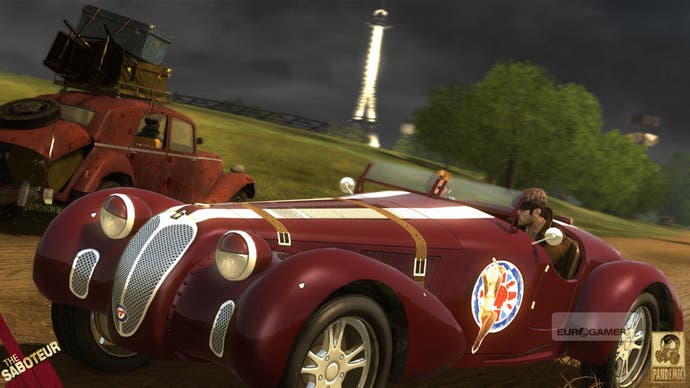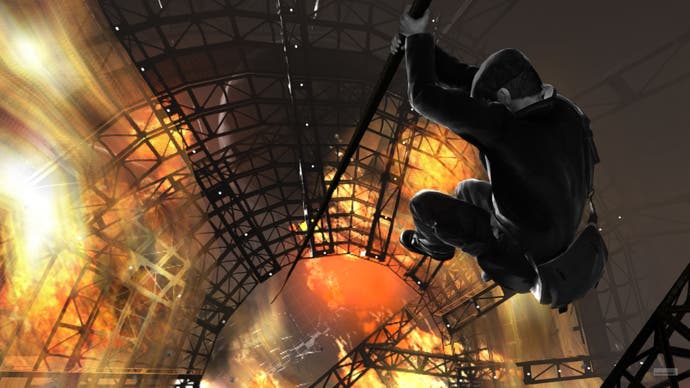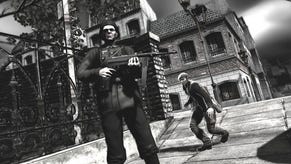The Saboteur
Resistance is futile.
While most of the missions are fairly uninspiring, that often goes with open-world territory, and some of the larger events Pandemic has thought up are actually pretty entertaining: fighting through a castle and up onto a burning Zeppelin was always going to be fun, even if the game's guns are a little toothless. A prolonged sequence near the middle in which you wire up a railway bridge to explode before shooting your way through a train may be an exercise in videogame clichés, but it's still quite a nice exercise.
On top of that, the game's cars feel really good to race through the streets of Paris - even if Paris itself is, landmarks aside, rather forgettable - and there are plenty of side quests, car collecting, and other little objectives to do if you tire of the main storyline. Plus there's just loads of backtracking to enjoy.
Borrowed ideas are also everywhere to be seen, from the escape radius of GTAIV to the parkour of Assassin's Creed and the visibility radar from titles like Prototype (this is a little circle on the bottom of your mini-map that tells you that you're being watched, and that it's probably not too long before Jerry turns up to give you a shoeing).
Creative theft is hardly a rarity either these days but Pandemic doesn't always seem to understand the mechanics it's pillaging: the game's stealth is even more artificial than it is in a lot of other titles, with Nazis forgetting all about you the minute you hide in a shed in most cases. Almost any suspicion aroused by weird behaviour can be cancelled out if you simply walk rather slowly for a few seconds - even if you've just planted a bomb with a fizzing fuse in plain view of everybody.

Elsewhere the options to clamber up the walls and guttering of Paris is graceless and fiddly in implementation, making you feel less like Assassin's Creed's nimble athlete and more like the unfortunate star of a government anti-binge-drinking ad - which, granted, may have been what the team was going for.
Then there are design botches that are just inexplicable. It's a tiny detail, certainly, but given Devlin's Spider-Man skills, someone obviously figured that getting to the top of the Eiffel Tower would make a lovely Crackdown-styled challenge, even rewarding you with an Achievement. That's a great idea but the concept is undermined by the fact that the game provides you with, like, a couple of elevators to get you up there. Why not just cart everyone from start screen to end credits in a bath chair with a tartan rug over their legs?
On top of all that, with the moody black-and-white filters off, Saboteur is a rather unattractive game, with boxy environments and grim textures. Character animation is jerky and puppet-like and the numerous sheeny-skinned strippers hanging around at one of Devlin's favourite haunts look like they've been dipped in superglue. Teenage boys will like it, certainly, but then they've probably had a thing for glue for quite some time.
When you realise that a few years ago the studio that made this was capable of creating games like Full Spectrum Warrior - smart and vivid titles that genuinely broke new ground - Saboteur, which struggles to measure up to the likes of the Assassin's Creed and the GTA crowd, can seem a little bleak.

But just because the game isn't always that good, doesn't mean it's always that bad, either. Pandemic rarely wins in terms of the detailing but the city is a large playground filled with secrets, and the generous ranks of missions themselves rarely waste your time with unnecessary faffing, even if they are a bit dull in their conception.
On top of that, some of the game's visual tricks - windows and searchlights highlighted in rich yellow tints, Nazi armbands burning out of the screen in blood red - are quite eye-catching, even if the game struggles from a meteorological standpoint once you start liberating parts of the city and the transitions from film noir monochromes awash with rain to bucolic midday blue skies become a little jarring. In truth, I even found myself warming to Devlin by the end of the adventure, although perhaps this was merely the onset of Stockholm Syndrome.
The Saboteur, then: not half as bad as the limp first few hours suggest. It's perhaps not the greatest company epitaph in the world but, as Devlin might say, while throwing himself out of a speeding car, knocking back a slug o' the good stuff and mashing a Nazi's head in with one punch: "It coulda been a lot worse."


